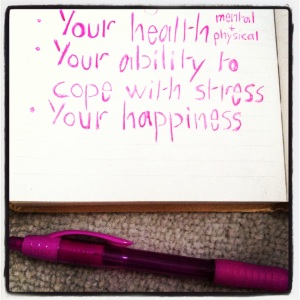Forget willpower. As I said in my previous post, I hate that word. So, to get it out of your and my vocabulary, I’ve Command F searched for “willpower” through this entire post and replaced it with “self-control” where possible. You’re welcome. Because self-control and delayed gratification is where it’s at.
Delayed gratification is the ability to resist the temptation of an immediate reward and wait for a greater reward later.
How can you build up your ability to delay gratification to achieve your goals without burning yourself out? Let me say that one of my motivations for writing this article… is my own interest in developing my own ability to delay gratification (hey, I’m not completely selfless, and I’m certainly not perfect). I have become more and more impatient with certain things, and I’d like to get myself back to a place where I can find a balance of chaos with schoolwork, work, exercise, social life, relaxation, etc.
The current trend for EVERYTHING is instant gratification, whether it’s through technology (“there’s an app for that”), food and agriculture (fast, convenience foods), weight-loss (appetite suppressants, 8-minute workouts). But in reality, you have to be patient to see results and achieve success. You will have to do some things that are unpleasant, work hard, and wait a long time in order to achieve something. You may not love what you’re doing now, but if you’ve planned it well, it will get you to where you want to be. So, I’m writing mainly from a place of research and a bit of experience. Here’s what I’ve found.
How to build your ability to delay gratification (in no particular order):
- Feed your brain
- Distract yourself
- Don’t deprive
- Identify the value
- Re-frame your motivation
- Believe in yourself
- Don’t overtrain
- Eliminate some decisions
- Prepare with “if, then”
- Practice regularly
- Establish habits
Feed your brain
Your brain is powered by glucose, and glucose alone. People who exerted self-control in a lab study had lower blood glucose levels afterwards than those that didn’t do tasks that required self-control. So, perhaps a task that requires self-control causes the brain to utilize more glucose than a task that doesn’t. Another study showed that drinking sugar-sweetened lemonade helped restore self-control, while sugar-free lemonade did not. (Review paper on self-control and blood glucose.) This doesn’t mean eat a ton of sugar to maintain your self-control. But it does mean eating regularly to keep your “self-control tank” filled with ammunition. Don’t let the term “sugar” fool you, either. Eating foods with a lower glycemic load (more fiber, some fat, some protein, not a huge amount of refined carbs) will help prevent sugar spikes and sugar crashes, but still allow for adequate release of glucose into the bloodstream (and your brain). Carbs are not the enemy here. This fact about glucose and self-control is one of my arguments against intermittent fasting.
Distract yourself
In Walter Mischel’s famous marshmallow study, he asked preschool children to choose between eating one marshmallow right away, or waiting to eat the first for an unspecified amount of time in order to receive a second marshmallow. He found that the children who distracted themselves by closing their eyes, looking away, or playing with toys were more likely to resist the first marshmallow than those who stared directly at the marshmallow. (Google the study yourself, or read a good summary article here.) This seems like common sense, but think about it in a different context. You’re working late. You’re so tired. You’d really like to go to sleep, and you can see your bed from your desk. Distract yourself. Remove the temptation. Move to the living room. Work at the office. Work at the library. Distract yourself from what you really want, for the time being. Delay that gratification.
Don’t deprive
When does distraction not work? When you tell yourself, “I can never have that chocolate cake ever again.” And you force yourself to choose that flavorless fat-free diet-food brownie. Indefinitely. You need a time-frame for a distraction. The children in the study were eventually allowed to have the marshmallows (that would be a pretty unethical study if those kids were denied marshmallows… Cruel scientists!). You will eventually need to sleep. You will probably have that chocolate cake again because it’s the best damn cake you’ve ever tasted and you can’t imagine your life without tasting it one more time (exaggerating here but you get the idea). But you can resist, so you don’t have it as often. Eventually you might even stop craving it, and realize it doesn’t taste as good as you thought. But for now, distract and indulge a bit, distract and indulge a bit… (not a lot! moderation!) Balance is the key to strengthening self-control, not deprivation.
Identify the value
Remind yourself why your goal is important. Why is the self-restraint necessary right now? If self-control can be depleted, it can never really be fully exhausted. Researchers think that we reserve some self-control for possible demands in the future. If you can find the right motivation, you can do pretty much anything.
But… sometimes you have to repackage the motivation. You want to lose weight so you look good in a bathing suit. Ok, that’s a good goal, nothing to be ashamed about. But finding more reasons can be important to keep you from making excuses against that original motivation. “Oh, summer’s not for another 6 months…” There goes the value of your original motivating factor. Brainstorm some other reasons for losing weight, training hard, and eating healthy. Making your ex jealous? Ok… maybe. Although I caution against doing something because someone else doesn’t believe in you. Why focus on that negativity/revenge mindset when you have so much else going for you? Find the positive motivation. Find friends that will support you, not bring you down. See the next point on finding the right motivation. What about fitting into your favorite corduroy pants (everyone wants to fit into their jeans, what about corduroys)? Being able to run 5K? Reducing that pain in your knees? Being able to play with your kids? Prevention against diabetes that runs in your family? The more reasons you have, the more value your goal has, and the easier it is to draw upon your self-control. I recommend creating a bulletin board with your goals and motivations, or using Pinterest to remind yourself of your goals and the value those goals have.

Losing weight for your knees is a lot better than losing weight for your ex. They’ll appreciate the weight loss much more, trust me.
Re-frame your motivation
Only you know what drives you. Is it money? Attention? Knowledge? Novelty? Love? That fuzzy feeling you get from helping others? Find those things that make you tick and re-frame everything you do in terms of those things. If it doesn’t fit anywhere… ask yourself, why are you doing it? If the answer is “for someone else,” that’s fine, just be sure they are someone you care about or respect (or maybe have to respect). Like I said, no negativity or revenge mindsets here.
Also, I want to revisit that article by Matthew Lieberman that I mentioned in my previous post. Smart guy. Nerdy, but smart. Self-control is about regulating yourself for yourself and others. Remember that and you will go far, much further than if you were doing it all just for you. Try to re-frame your goals and motivations in terms of the effects they will have on others. You are always much more likely to do something if you are accountable to someone else. A personal trainer is someone you are not only accountable to to meet at the gym each week for your workouts, but also someone who knows about your goals, who will give you assignments and deadlines to meet. Like your boss expecting a report on his/her desk by 8am tomorrow morning… Someone who you will feel pressured to please and perform for. As a personal trainer, I’m not here to judge you about your decisions, but I am here to light a fire under your butt so you’ll do things when you should do them. Other things like regaining your health and losing weight for your loved ones, children, grandchildren, significant others… Committing your life to research or education to help someone you care about… Helping people learn more about a subject you are passionate about… all these things can be a good way to re-frame your motivation to help you reach your goals.
Believe in yourself
Not to sound corny or anything, but believing in yourself is a big part of self-control. Stay positive. Researchers have found that self-control can be worn away, chipped down. However, people who didn’t believe self-control was easily depleted showed fewer signs of fatigue or depletion compared to those that believed self-control was a limited resource. Stand your ground! Believe that you have more restraint, and you’ll be able to utilize it. Positive thoughts alone might not do it for you, but it just takes that extra burst of positivity to call upon the aforementioned tactics (distraction, identifying value, finding the right motivation) to refuel your self-control.
Don’t overtrain
Remember that using self-control in one area of your life can affect your ability to restrain yourself in other areas. Don’t constantly say “No” to yourself. No, you can’t workout, you have to work. No, you can’t go out with friends, you have to study. No, you can’t eat that, you have to lose weight. No, you can’t… eventually you’ll give in, and it might not be a very pretty sight. Just sayin’… Give yourself some slack. Discretionary calories, relaxation time, sleep, whatever. You need it, and you deserve it.
Eliminate some decisions
Taking away some difficult decisions can help preserve your abilities for unexpected or unavoidable tests of your self-control. Don’t want to eat that chocolate in the candy dish on your desk? Don’t restock it. Well, duh. Let’s get a bit more complicated. Read this exert from that APA Willpower article that references an interesting study:
They offered the customers a chance to open individual savings accounts, with a catch. The customers could withdraw their funds only after they’d reached a target date or target savings amount that they themselves had chosen. After a year, participants who enrolled in the accounts saved 82 percent more than customers in a control group who had not opened the special accounts. Eliminating the decision of whether to spend or save helped customers avoid willpower failure.
Let’s expand this idea. How about overall healthy eating and meal planning? Packing your lunch and planning your meals ahead will eliminate so many food decisions throughout your day. You already have a plan, no need to wonder what your next meal will be. This leads into the “if, then”…
Prepare with “if, then”
This is called implementation intention. You identify a scenario. “If I am offered a drink at the party…” And you plan ahead by identifying your next action. “Then, I will order tonic with lime.” (From that APA Willpower article I keep mentioning). Implementation intentions can help people exert self-control, even when their resolve is depleted. It can help you make a decision in the moment without drawing from your self-control reserve. “If I get out of work late, then I will get a salad from Sweetgreen (my new favorite salad place in Boston!) on my way home.” “If I don’t go to the gym, then I will take the stairs at home and work.” That’s fine, but make sure this is a plan, not a punishment. “If I don’t go for a run, then I will skip lunch” is not the kind of thinking I’m looking for.
Practice regularly
Use it or lose it. Pretty much this is why I’m struggling here. For the past 2 years, I’ve had a relatively relaxed schedule. Personal training allowed me to make my own schedule and do what I wanted pretty much whenever I wanted. Hey, it wasn’t all clouds and rainbows, but it was a very flexible schedule. I had a lot more free time. I could have leisurely 2-hour workouts, 2-hour naps… ah, that was the life. Now, I have to balance work with school, not to mention adjust to living in a new city, meeting new people… I have to manage my time really well.
The more you practice patience and wait for something that you really want, the easier it will be later on when you really need or have to delay your gratification. For example, let’s say you are financially stable right now. You are used to buying whatever new piece of clothing or technology whenever it becomes available and catches your attention. You have depleted your ability to resist spending money when you want something. If you start resisting small temptations when shopping, or set a time frame on something (i.e., I can buy one piece of new clothing when I receive my paycheck), you will be more equipped to deal if you enter a more financially unstable situation and have to restrict even more.
And lucky for you, this adaptation may not be too specific. Neurologist Richard Restak says, “Increasing activity in the area that regulates self-control (the PFC), for example by thinking twice before you buy something, enhances the functionality of this area permanently” (from Baby Steps to Grown-Up Control). So, exhibiting restraint in your shopping habits can positively impact your ability to resist that dessert after dinner over time!
Establish habits
Continuing the idea above… habits are more specific to a certain action. Once a good habit is in place, you’ll no longer need to exert self-control to make a good decision. Check it off your list. You walk by the cupcake store enough times without buying one, your self-control will no longer be depleted every time you walk by a Crumbs. You can focus your self-control to another task.
Putting it all together
Sometimes you can have your cake and eat it, too, but that’s not what I’m talking about here. It’s not whether you can have both, it’s whether you can resist one for the betterment of yourself to build your self-control.
Eat regular meals. Find ways to distract yourself. Remember to identify the value and re-frame the motivation for your goals. Stay positive. Don’t deprive yourself, and don’t overtrain. Allow some yes’s in your life. Plan ahead with “if, thens,” and eliminate some decisions. Regularly practice and repeat to develop habits. Practice and repeat all of the above. Pretty soon that self-control muscle will be looking pretty toned and well-defined. Sexy.






